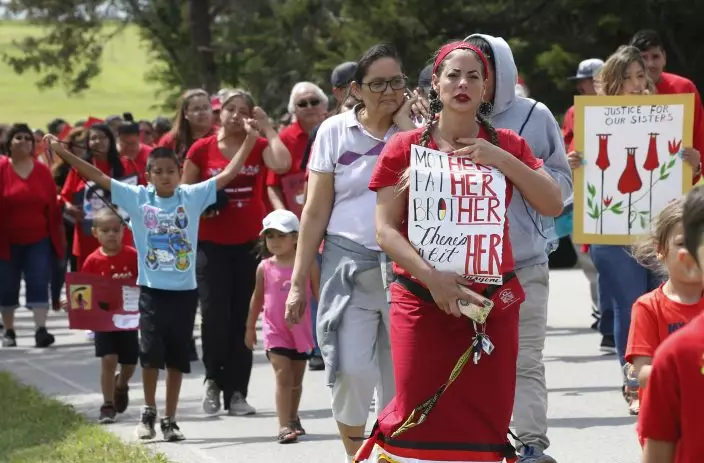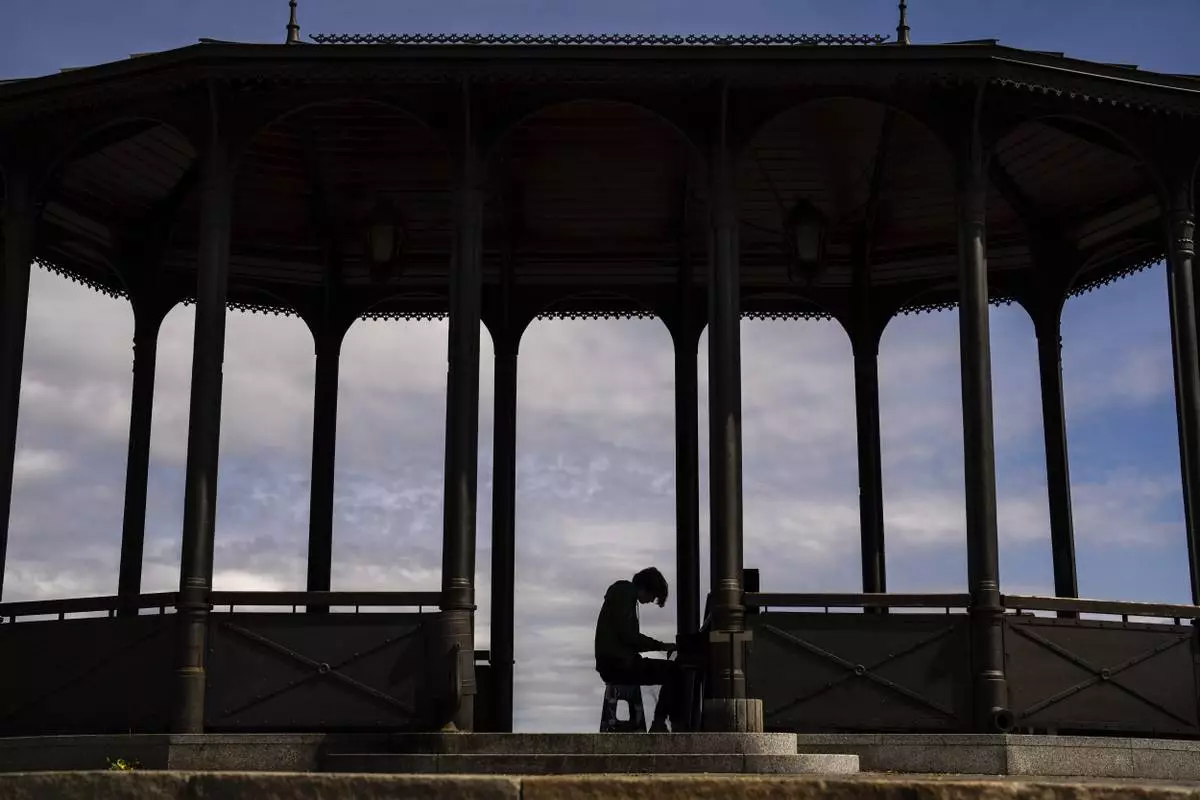For the second month in a row, U.S. officials tasked with carrying out federal public safety policy for tribes missed a deadline to provide input on legislation to curb violence against Native American women.
U.S. Sen. John Hoeven, R-North Dakota, had set a July 8 deadline for Interior and Justice Department officials to offer positions and guidance on a slate of bills that aim to stem domestic violence, homicides and disappearances of Native Americans on tribal lands.
Hoeven, who chairs the U.S. Senate Committee on Indian Affairs, had set the deadline for both departments after criticizing officials for filing late testimony and saying they arrived at a hearing in June unprepared to fully weigh in on legislation.

FILE - In this Friday, June 14, 2019, file photo, Miranda Muehl, of Mustang, Okla., marches during a march to call for justice for missing and murdered indigenous women at the Cheyenne and Arapaho Tribes of Oklahoma in Concho, Okla. U.S. Senate staffers say officials missed a second deadline on July 8 to offer input on bills on Native American safety, and only one department has since provided “partial comment.” (AP PhotoSue Ogrocki, File)
A week after the new deadline passed, a spokesman for Sen. Tom Udall said Monday that Justice officials had yet to provide positions on the legislation, while the Interior only provided "partial comment." Udall, D-New Mexico, is a co-chairman of the committee with Hoeven.
An Indian Affairs committee spokeswoman said in response to inquiries from The Associated Press that the Interior's guidance on bills had been submitted late, though she did not say which day. She and Interior officials would not release the documents that had been sent to the committee.
Meanwhile, a spokesman for the Justice Department told the AP late Monday that the department is working as quickly as possible to provide positions on the bills, and had provided a status update to the committee chairman's office.
"I was deeply frustrated when DOI and DOJ showed up completely unprepared to our committee's hearing on these critical bills," Udall said in an emailed statement. "Weeks later, the administration still has not delivered on its promised 'renewed commitment' to tribal public safety, failing to meet this deadline even after being granted an extension."
Lawmakers need feedback from the Trump administration in their effort to take necessary legislative action to address public safety for Native Americans, Udall said. In recent months, a wave of bi-partisan legislation in Congress has sought to expand coordination for crime-fighting among federal agencies and expand tribes' ability to prosecute non-Native Americans in sex assault cases and crimes against law enforcement and children.
The bills come in response to a national movement to build awareness of the deaths and disappearances of Native American women, who are victimized at alarming rates. The most recent federal figures show more than half have encountered sexual and domestic violence at some point during their lives, with advocates saying the population is left vulnerable in part because their safety has been disregarded or ignored over the years.
In May, U.S. Attorney General William Barr visited Alaska, where tribal representatives told him about the lack of law enforcement in villages and slow response times to calls.
At last month's committee hearing, Tracy Toulou, director of the Justice Department's Office of Tribal Justice, said that visit had led the department's leadership to express a renewed commitment to public safety among tribes and Alaska Native villages.
He also apologized for the late testimony, explaining that the bills are complex and require wide review within the Justice Department. The review process can be lengthy and span multiple agencies.
Charles Addington — the director of the Office of Justice Services, which falls under the Interior's Bureau of Indian Affairs — also apologized for the late filing of testimony. He said his comments had been held up during a clearance process.
The Senate's Indian Affairs committee has been seeking immediate comment from federal officials on five specific bills, including Savannah's Act. It proposes to increase tribal law enforcement's access to criminal databases, increase data collection on missing persons cases and set new guidelines for law enforcement's response to reports of missing Native Americans.
KYIV, Ukraine (AP) — A Ukrainian court on Friday ordered the detention of the country’s farm minister in the latest high-profile corruption investigation, while Kyiv security officials assessed how they can recover lost battlefield momentum in the war against Russia.
Ukraine’s High Anti-Corruption Court ruled that Agriculture Minister Oleksandr Solskyi should be held in custody for 60 days, but he was released after paying bail of 75 million hryvnias ($1.77 million), a statement said.
Ukraine’s National Anti-Corruption Bureau suspects Solskyi headed an organized crime group that between 2017 and 2021 unlawfully obtained land worth 291 million hryvnias ($6.85 million) and attempted to obtain other land worth 190 million hryvnias ($4.47 million).
Ukraine is trying to root out corruption that has long dogged the country. A dragnet over the past two years has seen Ukraine’s defense minister, top prosecutor, intelligence chief and other senior officials lose their jobs.
That has caused embarrassment and unease as Ukraine receives tens of billions of dollars in foreign aid to help fight Russia’s army, and the European Union and NATO have demanded widespread anti-graft measures before Kyiv can realize its ambition of joining the blocs.
In Ukraine's capital, doctors and ambulance crews evacuated patients from a children’s hospital on Friday after a video circulated online saying Russia planned to attack it.
Parents hefting bags of clothes, toys and food carried toddlers and led young children from the Kyiv City Children’s Hospital No. 1 on the outskirts of the city. Medics helped them into a fleet of waiting ambulances to be transported to other facilities.
In the video, a security official from Russian ally Belarus alleged that military personnel were based in the hospital. Kyiv city authorities said that the claim was “a lie and provocation.”
Kyiv Mayor Vitali Klitschko said that civic authorities were awaiting an assessment from security services before deciding when it was safe to reopen the hospital.
“We cannot risk the lives of our children,” he said.
Meanwhile, Ukrainian President Volodymyr Zelenskyy was due to hold online talks Friday with the Ukraine Defense Contact Group, which has been the key international organization coordinating the delivery of weapons and other aid to Ukraine.
Zelenskyy said late Thursday that the meeting would discuss how to turn around Ukraine’s fortunes on the battlefield. The Kremlin’s forces have gained an edge over Kyiv’s army in recent months as Ukraine grappled with a shortage of ammunition and troops.
Russia, despite sustaining high losses, has been taking control of small settlements as part of its effort to drive deeper into eastern Ukraine after capturing the city of Avdiivka in February, the U.K. defense ministry said Friday.
It’s been slow going for the Kremlin’s troops in eastern Ukraine and is likely to stay that way, according to the Institute for the Study of War. However, the key hilltop town of Chasiv Yar is vulnerable to the Russian onslaught, which is using glide bombs — powerful Soviet-era weapons that were originally unguided but have been retrofitted with a navigational targeting system — that obliterate targets.
“Russian forces do pose a credible threat of seizing Chasiv Yar, although they may not be able to do so rapidly,” the Washington-based think tank said late Thursday.
It added that Russian commanders are likely seeking to advance as much as possible before the arrival in the coming weeks and months of new U.S. military aid, which was held up for six months by political differences in Congress.
While that U.S. help wasn’t forthcoming, Ukraine’s European partners didn’t pick up the slack, according to German’s Kiel Institute for the World Economy, which tracks Ukraine support.
“The European aid in recent months is nowhere near enough to fill the gap left by the lack of U.S. assistance, particularly in the area of ammunition and artillery shells,” it said in a report Thursday.
Ukraine is making a broad effort to take back the initiative in the war after more than two years of fighting. It plans to manufacture more of its own weapons in the future, and is clamping down on young people avoiding conscription, though it will take time to process and train any new recruits.
Jill Lawless contributed to this report.
Follow AP’s coverage of the war in Ukraine at https://apnews.com/hub/russia-ukraine

Ukrainian young acting student Gleb Batonskiy plays piano in a public park in Kyiv, Ukraine, Thursday, April 25, 2024. (AP Photo/Francisco Seco)











